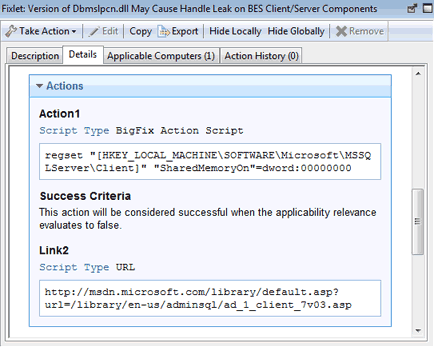Actions
Actions are scripts that run on selected targets. They are used to fix policy violation and security exposures and to run configuration steps. Fixlet, tasks, and baselines depend on actions to run their remediation mission.
Actions are triggered by a console operator using a take action command. They can be run independently or as part of Fixlets, tasks, or baselines.
An action is described using a proprietary language, the action language. For more information about the action language, see the BigFix Developer site.
Actions can be used in synergy with relevance expressions to customize a specific solution for specific BigFix Clients.
There are two types of actions:
- Default actions
- They are optionally included in Fixlet and tasks at authoring
stage. They run automatically on relevant targets when the Fixlet
or the task is deployed. You can view the information about the default action, if any defined, in the Details tab of the Fixlet message or task.

You must run the Take Action command to deploy the related Fixlet or task. You can still customize on the fly the action when you run the Take Action command. Depending on the number of Fixlets or tasks that you want to submit concurrently, one or more than one, you can: - Custom actions
- They are used to fix problems or to address issues that are not covered by the default action or to customize the action for your specific environment. Custom actions override default actions. To create and submit a custom action you must run the Taking a custom action command.
Warning: Actions cannot be automatically undone. If you
need this capability you must code it in the action itself.
These are the activities that you can run against actions from
the BigFix console: